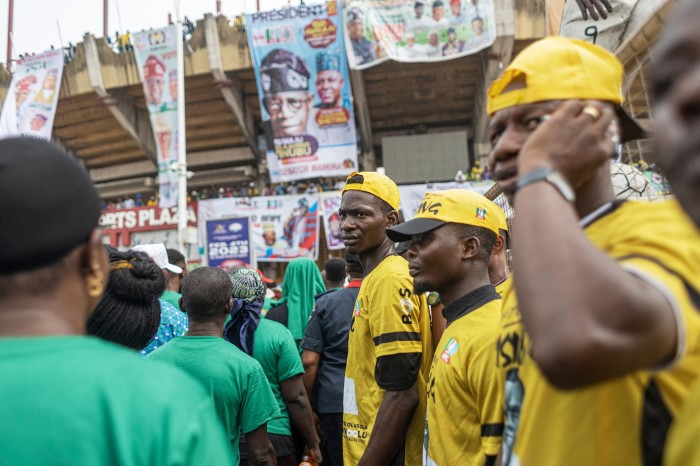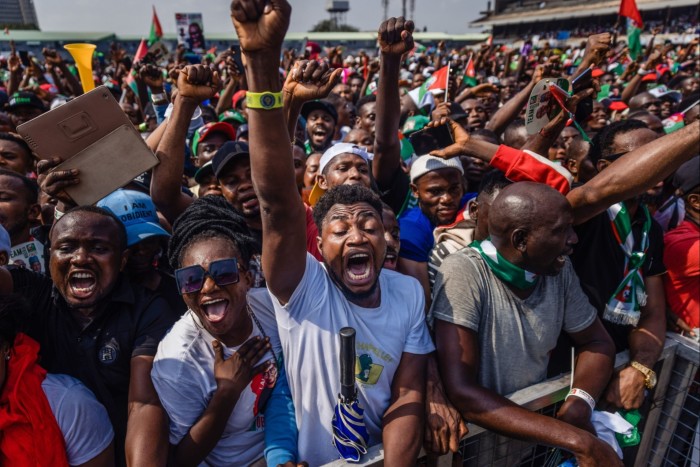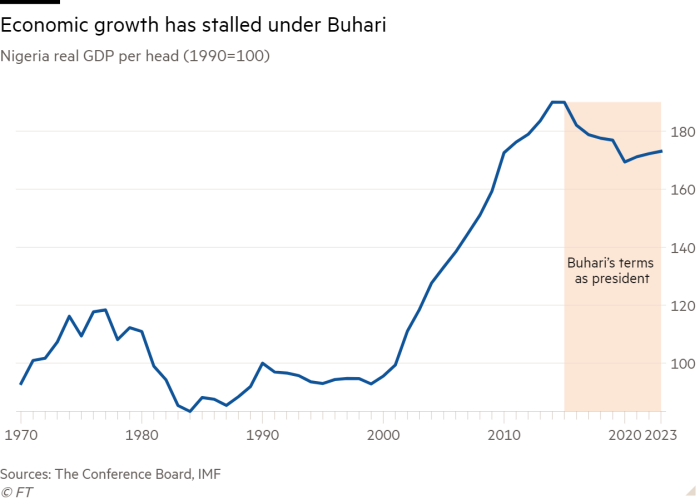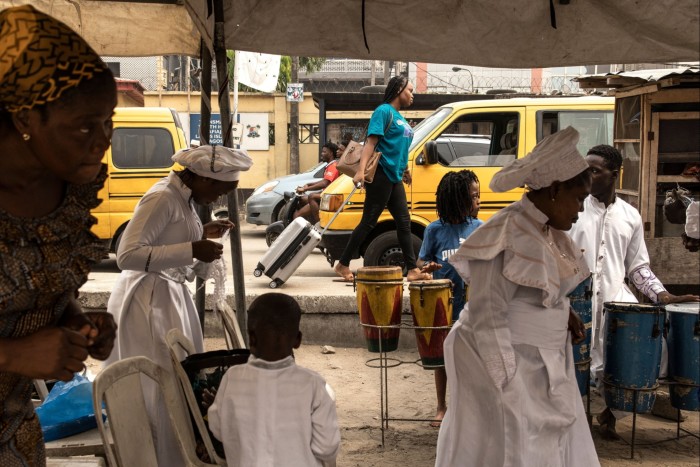It was in January that the comedy routine of Mr Makati began to change. His weekly Saturday night standup at the Memento Lounge in Lagos, Nigeria’s pulsing commercial capital, switched from gags about the daily hassles of living in Africa’s most populous nation to the practicalities of voting.
“He was telling jokes about how to obtain your PVC [Permanent Voter Card], getting people to register to vote,” says the novelist A Igoni Barrett, a regular at the club. Although no names were mentioned, Barrett says, everyone knew what the voter registration drive was all about.
“Ninety per cent of the audience supports Peter Obi,” Barrett estimates, referring to the relative political newcomer whose emergence as a credible candidate has electrified young voters and shifted the odds in this month’s presidential election. “Nigerians are trying to take back power through the ballot box,” he adds.
Nigeria is the biggest economy in Africa and home to at least 216mn people, though some sources put the figure closer to 220mn. Its population will nearly double in the next 25 years to 400mn, surpassing the US as the world’s third most populated country.
The success or failure of this oil-rich mammoth matters greatly to Africa and to the rest of the world, says Chidi Odinkalu, a professor at the Fletcher School of Law and Diplomacy at Tufts University. The election is being fought against the backdrop of rampant insecurity and economic stagnation. Crisis-ridden Nigeria is no longer the stabilising force it once was in a region where coups, terrorism and Russian influence are proliferating.
“No one wants to see Nigeria go up in flames,” says Odinkalu. “We have been teetering on the brink for such a long time that Nigerians have come to believe we are defying the laws of gravity. But some day, gravity will have its say.”
In the first round of voting on February 25, Obi, 61, will take on two more seasoned politicians with much deeper pockets and the backing of well-greased party machines. Bola Tinubu, 70, a former governor of Lagos and political kingpin running for the ruling All Progressives Congress party, is considered the man to beat. Atiku Abubakar, 76, a former vice-president, is making his sixth run for president as a candidate for the People’s Democratic party.
A few months ago, most Nigerians assumed the contest was between these two wealthy septuagenarians, a depressing prospect for many in a country where the median age is 18. There is a growing disaffection with big-money politics dominated by the same old faces.

By contrast, Obi, a businessman and former governor with a carefully crafted reputation for shunning the accoutrements of power, is something new. Yet all but Obi’s most loyal supporters, who call themselves “Obidients”, are realistic about him being an urban phenomenon whose chances of converting social media buzz into victory are slim.
Sceptics say Obi’s tiny Labour party, which has no governors and only one senator, lacks the organisational capacity to get the vote out or to properly monitor the country’s nearly 177,000 polling stations to mitigate potential vote-rigging and other election-day tricks. Others deride Obi’s purported popularity as “four people tweeting in a room”.
A string of opinion polls put Obi well ahead of the two would-be frontrunners, whose campaign managers are privately rattled. Yet experts warn that polls, which tend to pick up the views of smartphone-owning urbanites, are unreliable. They may not accurately reflect the broader electorate in a multi-ethnic country where more than 500 languages are spoken. Polls are particularly sketchy outside the big cities, where people are sometimes paid in bags of rice or bundles of notes to vote for a particular candidate.
Many voters are keeping their intentions to themselves. In a recent poll by the data company Stears, 27 per cent said they would vote for Obi, putting him 12 points ahead of Tinubu. But 37 per cent of respondents declined to disclose their voting intention.

All of these factors help explain why political analysts consider this election the hardest to predict since Nigeria returned to democracy in 1999. The serious challenge by Obi, the first third-party candidate to make a dent during the campaign, means there is a possibility of a run-off for the first time in the country’s history.
Obi has won the endorsement of prominent Nigerians, including Olusegun Obasanjo, an elder statesman, and Chimamanda Ngozi Adichie, a celebrated author. In an open letter, Obasanjo, who ran Nigeria in the 1970s as a military general and again as elected president from 1999-2007, told young Nigerians they had the power to change history.
Some 40 per cent of 93mn registered voters are below 35. The more they show up to vote, in a country with a history of low turnout, the higher the chance of an electoral upset. In an interview with the Financial Times, Obasanjo said the youth vote and God would deliver Obi victory.
Odinkalu, of the Fletcher School, puts much of the electoral excitement down to raw hope. “Nigerians are in search of magic,” he says. “They are looking for a miracle.”
Everything at stake
Nigeria is not simply a failing state. Africa’s “sleeping giant” has a swagger and entrepreneurial drive reminiscent of the US.
A Nigerian, Ngozi Okonjo-Iweala, heads the World Trade Organization. Tech start-ups in Lagos, including several unicorns, attract more capital than anywhere else on the continent. Nigeria is a cultural powerhouse whose artists, from author and TED-talk darling Adichie to Burna Boy, an Afrobeats singer, command a global following. Kano-born Aliko Dangote, who made his fortune in salt, flour and cement and is building the world’s largest single-train oil refinery, is Africa’s richest person.
In better times, this has counted. Nigeria has been an engine of regional, if not continental, growth and a democratic, stabilising force. Economically and diplomatically diminished, the country has drifted during the past eight years of President Muhammadu Buhari, a former military leader. A man who campaigned on a ticket of personal integrity has overseen an increase in corruption.
The economy, though still Africa’s biggest, has stalled. Under Buhari, income per capita has fallen and 90mn Nigerians live on less than $1.90 a day. At least a third of the population are out of work and tens of millions hold precarious jobs in the informal sector.
A recent survey by Afrobarometer, a pan-African polling organisation, found that 89 per cent of Nigerians thought their country was heading in the wrong direction. “What’s at stake in this election?” asks Ayoade Alakija, a health expert and critic of the political elite. “Nigeria is at stake,” she says. “Our very statehood is at stake.”
Security is in an appalling state. During Buhari’s presidency, some 60,000 people have been killed by terrorists, criminal gangs or the army, according to data compiled by the Council on Foreign Relations.
Though the threat from Boko Haram has receded, the Islamic State of West Africa Province, an Isis offshoot, kills and plunders with virtual impunity in some northern states. Violent herder-farmer clashes have spread to almost all parts of the country. Secessionist agitations in the south-east, which fought an almost three-year civil war in the late-1960s to create a breakaway Biafra state, has strengthened, causing violence and unleashing state repression.
Kidnappings and extortion have surged. “Almost everybody knows someone who has been abducted,” says Toni Kan, a public relations consultant who has moved to London because of safety concerns, part of a gathering brain drain.

Economic prospects look bleak. Foreign investment has shrunk. The manufacturing base has withered. Nigeria relies on petroleum exports for 80 per cent of government revenue, a structural challenge. But so much oil is stolen by criminals and corrupt state actors that official production is below 1.3mn barrels a day, 500,000 barrels shy of Nigeria’s Opec quota.
Further ahead, the world is turning away from fossil fuels. “I keep telling people that, if you squint now, you can see the end of oil,” says Feyi Fawehinmi, an author and political commentator.
The central bank has compensated for falling revenue by running the printing presses, stoking inflation, now at 22 per cent. The tax base is a dismal 6 per cent of gross domestic product. Almost all government revenue is swallowed up by debt service and payment of government salaries.

Despite decades of oil revenue, much of it stolen, the state has never provided the public goods necessary for economic take-off. More than 10mn children are out of school, two-thirds of them girls. Once prestigious universities, including Ibadan, Ahmadu Bello and Nsukka, are a shadow of their former selves, unable to pay lecturers properly or maintain buildings. Health provision is poor, with Nigeria’s elite relying on foreign hospitals. At 53, Nigeria’s life expectancy is shockingly low, a decade below Ghana’s, a country with a similar income per capita.
“There’s been incredible damage. “We’ve gone back on almost every development index,” says Fakhrriyyah Hashim, a peace and security researcher, referring to the past eight years. “In our entire democracy, things have never been this bad.”
Route to a reset
For decades, most Nigerians have felt powerless to stop the rot, convinced that their lives are at the mercy of venal politicians. This election, unexpectedly, has offered a glimmer of something different.
“Sometimes you go so far in a certain direction that you hit a brick wall,” says Dimieari Von Kemedi, an entrepreneur and former presidential adviser. “Whether in nature or in human life, eventually you must reset.”

That reset, at least politically, may have begun early on in the pandemic when young people took to the streets against state brutality in protests known as EndSARS, referring to a particularly brutal police unit. The EndSARS movement morphed into a broader alliance against the failings of Nigeria’s political elite but was brutally suppressed in October 2020 when members of the Nigerian army opened fire on protesters in Lagos, killing at least 12.
At the time, Tinubu, nicknamed the “godfather of Lagos”, was seen as unsympathetic. Obi by contrast tweeted his support of the protests, a move that enabled him to tap into youth sentiment. “The EndSARS base has effectively become an Obi base,” says Hashim, the researcher. “Young people had to explore other ways of non-violently challenging the government — and elections are the perfect route.”
Obi made a fortune in the import-export business and in banking. He won his political spurs from 2006-2014 as a two-term governor of Anambra state, leaving state coffers in a healthier position than he found them. He ran as vice-president for the People’s Democratic party in Abubakar’s unsuccessful 2019 campaign, somewhat undermining his image as a political neophyte.
Despite his reputation for frugality and probity, Obi’s name appeared in the Pandora Papers, a leaked dossier of offshore wealth, which showed he had registered business entities in tax havens, failing to declare them as required. Obi says the money was legitimate and that he did not know he had to declare assets registered in family members’ names.
His opponents have arguably worse allegations against them. Abubakar was named in a 2010 US Senate committee report in connection with the transfer of $40mn in “suspect funds”. Tinubu had his assets frozen in the 1990s by the US government, which said it had probable cause to believe the money was linked to drugs. Tinubu settled the case with a payment of $460,000. Both men deny wrongdoing.
While Obi has question marks against his name in common with his two main rivals, he is an outsider in other ways. He is an Igbo from Nigeria’s south-east. Although Igbos are the third-largest ethnic group behind the Yoruba and the Hausa, an Igbo has never won the presidency since the return to democracy.
Neither has any presidential candidate outside the two main parties won more than 7.5 per cent of the vote since 1999. Candidates must win at least 25 per cent of the vote in at least two-thirds of Nigeria’s 36 states plus Abuja, the capital, to win.

There are doubts about whether Obi, a Catholic, can muster enough support in the predominantly Muslim north, where his faith and relatively low profile could count against him. He has chosen northern Muslim Yusuf Datti Baba-Ahmed as his running mate, a formula that has proven successful in the past. This time, Tinubu, a southern Muslim, has also chosen a northern Muslim as running mate, a so-called “Muslim-Muslim ticket” that may not play well in his southern heartland.
Experts say Obi’s strong showing, even if limited to the south, has complicated the electoral map, making it harder to predict the winner.
Nigerian elections have rarely been about policy. Politicians frequently swap party allegiance. This time, though, Obi’s participation plus the fact that current policies are clearly not working, mean the level of debate has risen, if only a notch.
Both Obi and Abubakar are promising pro-business policies and a bigger role for the private sector. All three have committed to taking on the two taboos of Nigerian politics: scrapping a ruinously expensive fuel subsidy and freeing up the exchange rate.
Abubakar Suleiman, chief executive of Nigeria’s Sterling Bank, argues that both distortions have warped economic incentives, facilitating corruption and promoting “rent-seeking” over productive activity. “These things have prevented the private sector from growing at a [sufficient] pace and creating employment. If we’d removed those subsidies, we’d have been in a very strong position today,” he says.

Lifting them will not be easy. Big vested interests profit from the opaque currency regime. Although the fuel subsidy benefits the car-owning middle class, poor people regard cheap petrol as one of the few things they get from the state. “Without legitimacy, whoever wins can’t take the decisions the country needs,” says Odinkalu of the Fletcher School. “If the person does not have legitimacy the country is going to burn.”
Dele Olojede, a Nigerian journalist who won the Pulitzer Prize, says it is important not to have unrealistic expectations of Obi, either about his capacity to win the election or to turn the country around if he pulls off a miraculous political upset. Like others, though, he acknowledges that Obi has shaken things up. “It’s a sign of improvement,” he says. “It forces the other two candidates not to take things for granted.”
This election is also likely to be less easy to rig, say political experts, thanks to improvements in the electronic voting system and the recent withdrawal as legal tender of old banknotes that could have been used to bribe voters. Kemedi goes so far as to conclude that “the old party machinery is broken”.
Olojede is more cautious. “I don’t think Obi will win, but there is a possibility of a surprise,” he says. “And any one of these guys will be better than Buhari.”
Data visualisation by Keith Fray


